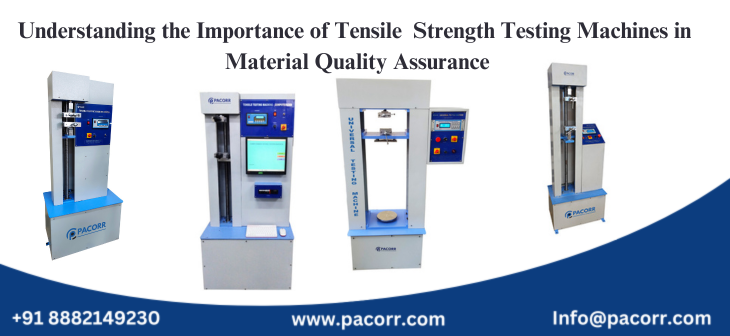
When it comes to ensuring the reliability, safety, and performance of materials used in industrial processes, tensile strength testing plays an indispensable role. Industries ranging from automotive and construction to textiles and packaging rely on tensile strength testing to verify the mechanical properties of their materials. Using advanced testing machines, manufacturers can simulate stress scenarios, measure critical properties like elongation and tensile strength, and ensure compliance with international standards like ASTM.
This guide dives deep into tensile strength testing machines, their applications across various industries, and how they contribute to quality assurance.
What is Tensile Strength Testing?
Tensile strength testing is a method used to evaluate the behavior of materials when subjected to a pulling or stretching force. It measures key parameters such as:
- Ultimate tensile strength: The maximum stress a material can withstand before failure.
- Elongation: The extent to which a material stretches before breaking.
- Modulus of elasticity: The stiffness of the material.
This type of testing is crucial in determining whether a material can endure its intended application without deformation, fracture, or failure.
The Role of Tensile Strength Testing Machines
Tensile strength testing machines are specialized devices that apply controlled tension to materials while capturing real-time data on their performance under stress. These machines are indispensable in industries where quality, durability, and safety are critical.
Key Types of Tensile Testing Machines
1. Rubber Tensile Strength Testing Machine
Rubber is widely used in industries like automotive, aerospace, and consumer goods, where durability and elasticity are crucial. A rubber tensile strength testing machine helps measure how well rubber materials can stretch and resist breaking.
Features of Rubber Tensile Strength Testing Machines:
- Precision load cells for accurate force measurement.
- Advanced grips to securely hold rubber samples during testing.
- Customizable speed settings for different test requirements.
2. Tensile Tester for Rubber Products
Testing rubber products like tires, hoses, and seals ensures their suitability for harsh environments and heavy loads. These machines simulate real-world stress scenarios, allowing manufacturers to improve the design and performance of their rubber products.
3. Fabric Tensile Testing Machines
Textiles require tensile testing to assess their strength, durability, and stretchability. Fabric tensile testers are used in the textile industry to evaluate the mechanical properties of woven, knitted, or non-woven materials.
Applications of Fabric Tensile Testing:
- Ensuring high-performance fabrics used in sportswear, protective clothing, and industrial applications meet the required standards.
- Testing upholstery fabrics for strength and longevity in furniture production.
- Assessing the tensile strength of geotextiles used in construction projects.
4. Polymer Tensile Tester
Polymers are essential materials in various industries due to their versatility, lightweight nature, and durability. A polymer tensile tester measures the strength, flexibility, and elasticity of polymer-based products such as plastic films, pipes, and components.
ASTM Tensile Testing Standards
Tensile tests are conducted following globally recognized standards to ensure consistency and reliability. One of the most widely used standards is the ASTM tensile test, which provides comprehensive guidelines for evaluating the mechanical properties of materials.
Examples of ASTM Standards for Tensile Testing:
- ASTM D412: Used for testing the tensile properties of vulcanized and thermoplastic rubbers.
- ASTM D638: Specifies the tensile properties of plastics, including stress-strain behavior.
- ASTM D5034: Focuses on fabric tensile testing, particularly for textiles used in consumer goods and industrial applications.
These standards not only ensure compliance but also help manufacturers optimize their products for specific applications.
Benefits of Tensile Strength Testing
- Improved Product Reliability: Identifying weaknesses in materials before they reach the market helps prevent failures in critical applications.
- Regulatory Compliance: Ensures that products meet industry-specific quality and safety standards.
- Cost Savings: By identifying material flaws early, manufacturers can avoid costly recalls and product failures.
- Enhanced Customer Satisfaction: Delivering high-quality, durable products builds trust and brand reputation.
How to Select the Right Tensile Testing Machine
When choosing a tensile testing machine, manufacturers should consider several factors:
- Material Type: Whether you are testing rubber, polymers, textiles, or metals, select a machine tailored to the material’s properties.
- Test Standards: Ensure the machine complies with relevant standards, such as ASTM or ISO.
- Accuracy and Precision: Look for machines with high-quality load cells and advanced data acquisition systems.
- Ease of Use: Features like digital controls, automated workflows, and user-friendly software enhance efficiency.
Tensile strength testing machines are essential tools for industries that prioritize quality, durability, and compliance. From evaluating rubber products to testing fabrics and polymers, these machines ensure that materials meet stringent performance criteria. By investing in advanced testing equipment, manufacturers can not only improve product quality but also enhance their competitiveness in the market.
For reliable tensile strength testing machines, trust Pacorr to deliver innovative solutions tailored to your industry’s needs.
Thanks to Pacorr Testing instruments, we have all the required quality testing instruments that have helped us to ensure the best quality delivered to our clients.

Danish
Fair Exports Pvt. Ltd.

